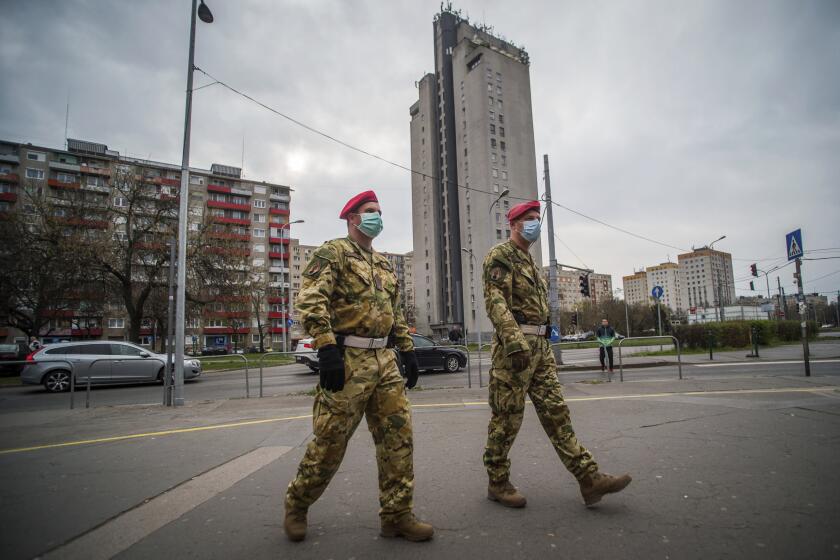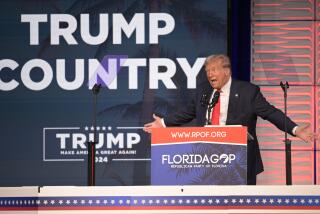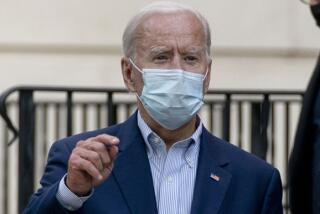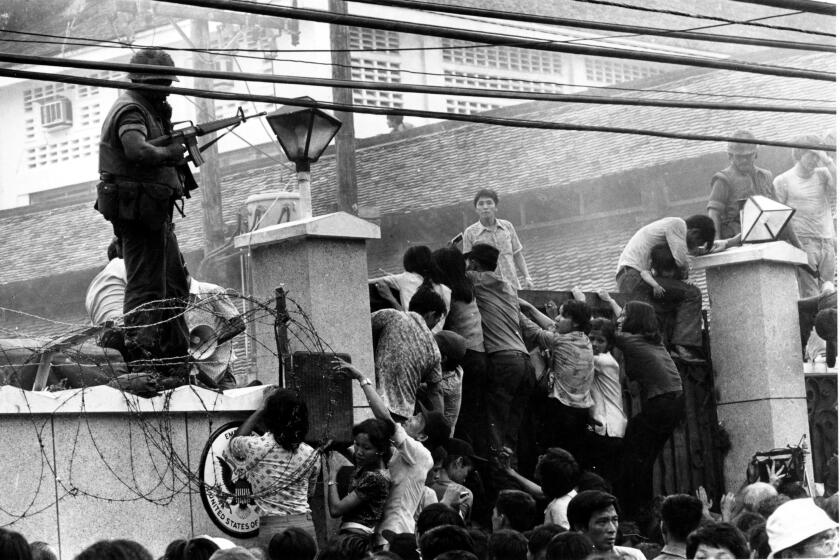Op-Ed: Why hasn’t Trump employed his powers during the coronavirus crisis? He’s too lazy
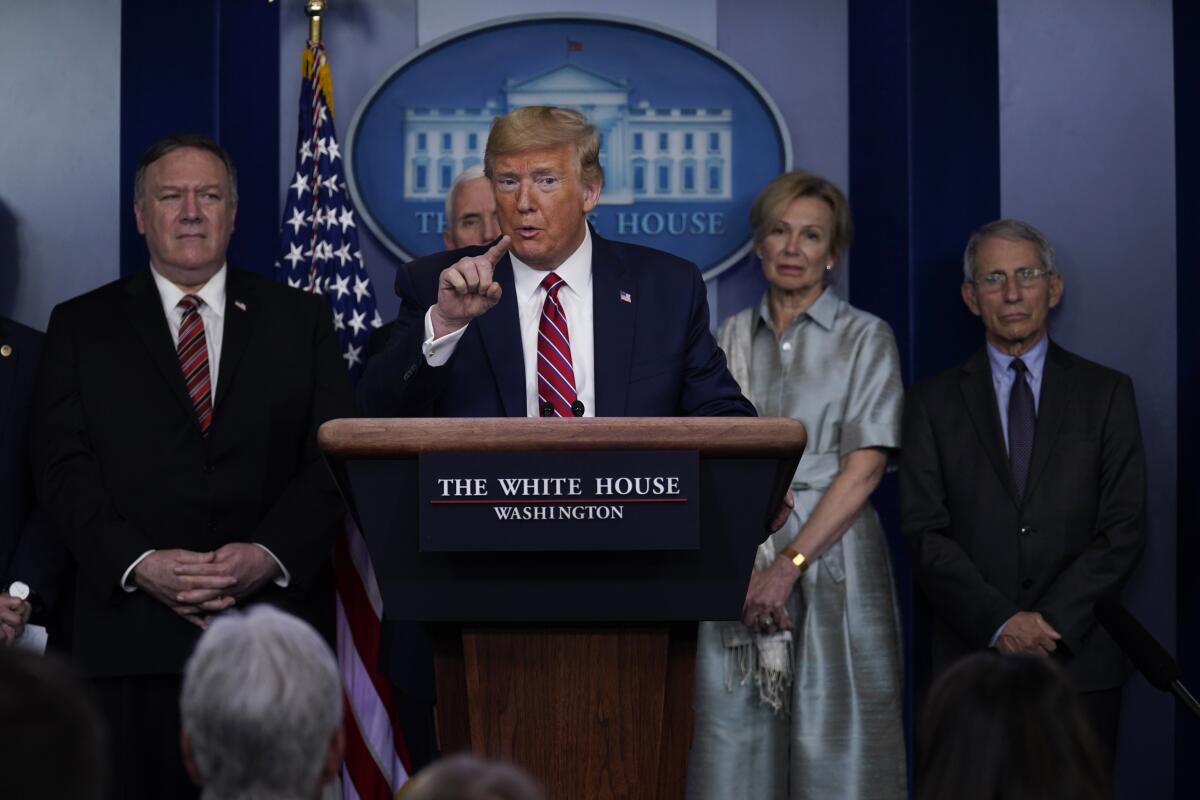
If you’re an aspiring dictator, this pandemic is a job opportunity. People are sick, dying, scared of getting sick and dying, and desperate not to be scared of being sick and dying. They want help. They want solutions. They want jobs. They want drugs. They want leaders with no pharmaceutical expertise to prescribe them drugs.
They are not interested in choices. They want to be told what to do.
James Madison warned that tyranny arises “on some favorable emergency.” In wartime, American presidents have encroached on our liberties. Abraham Lincoln suspended habeas corpus, Woodrow Wilson jailed dissidents, Franklin Roosevelt interned Japanese Americans, and George W. Bush instituted massive wiretapping. In 1972, Philippine dictator Ferdinand Marcos used a staged assassination attempt on his defense secretary to impose martial law and extend his rule for another 14 years. Using terrorism as a pretext, Russian leader Vladimir Putin seized control of private television in 2002 and abolished elected regional governors in 2004.
In response to the coronavirus pandemic, national governments are seizing new powers. South Korea and Singapore launched invasive surveillance systems. Bolivia suspended its presidential election. Israel’s prime minister is shutting down courts. Thailand’s prime minister can now impose curfews and censor the news media. Hungary’s parliament just gave Prime Minister Viktor Orban the power to suspend existing laws, suspend elections and rule by decree.
Invoking need for coronavirus control, authoritarian-minded leaders act to consolidate power. Hungary’s Orban is only the latest.
Last year, U.S. Ambassador to Hungary David Cornstein said that President Trump “would love to have the situation that Viktor Orban has.” Unlike Orban, Trump is lazy. As much as he would love to have dictatorial powers, he doesn’t want to put forth the effort necessary to seize them, even though he has a great excuse: preventing mass death. Instead of consolidating power, he is delegating to governors. Rather than fomenting public hysteria to justify emergency action, he minimized the dangers of the coronavirus, comparing it to the flu and saying it would go away on its own.
Even now, after his decision to keep social distancing measures in place through at least April, he doesn’t want to talk about the coronavirus. The focus of his April 1 press briefing was drug cartels. Five days later, he tweeted, “Fake News is bad for America!” So are hundreds of thousands of preventable deaths.
Americans want the federal government to do more to keep them safe. But Trump largely refuses to employ his powers. Until late March, he had hesitated to invoke the Defense Production Act — a wartime law his administration has used literally hundreds of thousands of times — to acquire coronavirus test kits and hospital equipment. Rather than using his powers, he simply wants to be adored for having them.
This isn’t to say that Trump misprizes all crises. To avoid taking responsibility, he’s desperate to manufacture a fake crisis to distract from his failures in this real crisis. Talking about drug cartels after predicting at least 100,000 deaths in the U.S. from the pandemic is like telling a meth addict that watching CNN will kill him. Trump is using his daily press briefings on his coronavirus response as a platform to distract us from his coronavirus response. Instead of trying to solve a real problem, Trump is offering new imaginary problems — that he can control.
He’s done it before. Trump stoked fears about illegal immigrants before the government shutdown last year. In an Oval Office address on Jan. 8, 2019, he said the word “crisis” six times and accused illegal immigrants of committing “30,000 sex crimes and 4,000 violent killings.”
After fabricating a crisis, the president declared a national emergency. The result? His fake crisis produced a real crisis: a partial shutdown of the federal government. Trump’s brief, impulsive attempt at autocracy failed, just like his fragrance, Success, did.
Trump prefers fake problems to real problems because real problems demand real solutions, which demand real work. Trump doesn’t like to work and rarely does. While marking 100 days in office, he complained, “This is more work than in my previous life. I thought it would be easier.” He spends most of his waking hours watching TV, tweeting and talking on the phone.
In addition to being too lazy to do things, Trump is uninterested in doing things. He’s interested in having things. This is what makes his narcissism malignant rather than benign. As the social psychologist Erich Fromm observed, narcissists derive their self-worth from their possessions, not from achievements.
Subverting democracy requires more effort than Trump is willing to exert. He wants to be a dictator, but he’s unwilling to do the work to become one. Just as he inherited a fortune, he wants to inherit an autocracy. To be a successful strongman, you need a strong work ethic. Trump has only weak ethics.
Windsor Mann is the editor of “The Quotable Hitchens: From Alcohol to Zionism.”
More to Read
A cure for the common opinion
Get thought-provoking perspectives with our weekly newsletter.
You may occasionally receive promotional content from the Los Angeles Times.
